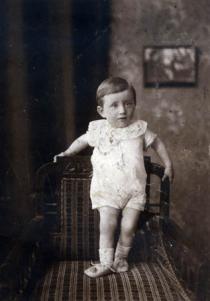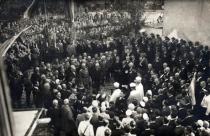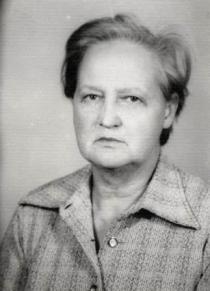My uncle Yosif Geron, brother of my mother Rebeka Avram Natan (nee Geron) together with his wife Iza Geron (left) visiting the mineral baths of Kyustendil. The postcard is dated: Kyustendil, 30th July 1937. The text bellow the date reads: 'As a souvenir from the Kyustendil’s baths'. It is signed by Yosif Geron, and is addressed to 'Dear Rebeka and Merkado'. The woman from the right is unknown.
My parents seldom went on holiday. I remember that one year we came to Sofia's Ovcha Kupel with my mother (there is a mineral water spa there) because of her illness. My mother and I used to visit my grandmother in Varna. My parents used to gather with their brothers and sisters as well as with my mother's cousins in Ruse. In 1933 and 1934 all my father's brothers gathered in Varna to visit my grandmother; Aron and Albert came from Dobrich [Romania at the time], Marko - from Milan (Italy).
We didn't have a garden, but we had a big yard in one of the houses, shared between four other buildings and we played there. My mother was ill because she had two hard births (mine and my brother's). She had problems with her physical condition and so we used to hire a housemaid from the neighboring villages Dimitrovden and Gergyovden for the winters. [The villages are named after Bulgarian Orthodox holidays. Dimitrovden is St Dimitar's Day, while Gergyovden stands for St. George's Day.] The housemaid had a bed in the kitchen.
We had both religious and mundane books, but I don't remember their titles. My parents did read, and especially my father, because my mother didn't have the time for it. Dad used to read contemporary novels. I remember that when I was 12, he brought home the 'Brown Book' [Editor's note: Probably a reference to 'Brown Plague' in the sense of Nazism.] against Hitler and I understood from it that Hitlerism persecuted Jews and communists. It was an international issue, it read also about the Leipzig trial [Georgi Dimitrov], for the Kristallnacht ['The Night of Broken Glass': the pogrom against German Jews. On the nights of 9th and 10th November 1938, gangs of Nazi youth roamed through Jewish neighborhoods breaking windows of Jewish businesses and homes, burning synagogues and looting. In all 101 synagogues were destroyed and almost 7,500 Jewish businesses were destroyed. 26,000 Jews were arrested and sent to concentration camps, Jews were physically attacked and beaten and 91 died (Snyder, Louis L. Encyclopedia of the Third Reich. New York: Paragon House, 1989:201)].
I haven't had a nanny, but for one year I attended the 'Gan Yeladim' kindergarten at the Jewish school. It was one year before I started school. 'Gan' means garden in Ivrit, while 'yeladim' stands for 'children'. After that I studied in the Jewish primary and secondary school. I was very good at mathematics. When uncle Bucco made us do sums, he would always ask me first what the answer was. This teacher whom we learned a lot of things from was a mathematician. From him we learned many sayings, many things, for example that the great violinist Bronislaw Huberman was a Jew. [Huberman, Bronislaw (1882-1947): a great violinist of the 20th century, born in Poland. He was highly acclaimed for his strongly individual interpretations.] We learned which famous people were of Jewish origin, he used to tell us about the Jewish lifestyle and traditions. He was a great man, a great pedagogue; for us he was not only our teacher in mathematics. His classes were exceptional. Later, every time I was in Ruse after the war I visited him until he passed away.
I did sports at 'Maccabi' - there were various competitions there. We used to play volleyball, table tennis, and two times a week we did gymnastics. I had a friend who used to come home and stayed with us for the night. From 6 a.m. to 9 a.m. we prepared our lessons. At 9 a.m. we were at 'Maccabi' where we played until 11:30. After that we used to have lunch before we go to school. The Jews in Ruse were not communists regarding their social status - we were rather intellectually attracted by the idea. As I already told you I read the 'Brown Book' and I knew the Hitlerism persecuted Jews and communists. In Ruse there were between 70 and 80 people, living in the Jewish street, who were organized in the UYW. I remember that we asked for special permission from the State Security Service to perform chamber concerts in the Jewish school. And when the day of the first one came we shuddered with fear because the head of the State Security Service and three or five agents came to listen to our music - but it was because in Ruse there was no other place to listen to music then. That was one of the most significant cultural events in the town during the war. Apart from gathering to someone's house for a party the other thing to do was to go together with our parents to eat kebapcheta [traditional grilled meatballs] in the evenings - in our street there was a kebapche eatery, that was owned by Jews. The eatery was not kosher.





























